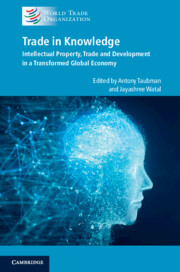Book contents
- Frontmatter
- Contents
- Figures
- Tables
- Contributors
- Preface
- 1 Thematic Overview: Charting the Evolution of Knowledge Flows
- Part I Conceptual Framework
- Part II Measuring Trade in Knowledge
- Part III Impact of Knowledge Flows on Trade and Development
- Part IV Policy, Regulatory and Legislative Frameworks
- Part V Looking Forward
- Index
4 - Intellectual Property and Digital Trade – Mapping International Regulatory Responses to Emerging Issues
from Part I - Conceptual Framework
Published online by Cambridge University Press: 17 February 2022
- Frontmatter
- Contents
- Figures
- Tables
- Contributors
- Preface
- 1 Thematic Overview: Charting the Evolution of Knowledge Flows
- Part I Conceptual Framework
- Part II Measuring Trade in Knowledge
- Part III Impact of Knowledge Flows on Trade and Development
- Part IV Policy, Regulatory and Legislative Frameworks
- Part V Looking Forward
- Index
Summary
This chapter explores how regulatory responses to emerging IP issues in digital trade may develop at the international level and in particular how existing mechanisms might influence the chances of developing internationally agreed rules in this regard. The primacy of state sovereignty in intellectual property up to the late 19th century gave way to the important WIPO treaties, which still retained some independence of member states and based international regulatory responses directly on national experience. While more regulatory sovereignty was ceded in TRIPS, the WIPO Copyright Treaty and the WIPO Performances and Phonograms Treaty, the adoption of non-binding instruments (such as the WIPO Joint Recommendations in the area of trademarks) show the limits of decision making by consensus. International non-state solutions such as the Uniform Domain-Name Dispute-Resolution Policy (UDRP) established by the Internet Corporation for Assigned Names and Numbers (ICANN) have introduced separate, technically determined solutions to specific IP issues. Proliferating free-trade agreements (FTAs) have emerged as a new platform to agree to IP-related regulatory responses that can be used to project the national solutions of a few dominant FTA-partners. However, these FTAs have also served to give legally binding status to internationally agreed non-binding recommendations. These diverse approaches are apparent in recent IP-regulatory responses to emerging digital issues that are particularly relevant for digital business models, including inter alia Internet service provider (ISP) liability, “safe harbour” provisions and the issue of orphan works, where there appears to be less agreement. Still further behind to reaching any kind of agreement are the emerging issues of online exhaustion, data mining and IP-related questions of artificial intelligence.
- Type
- Chapter
- Information
- Trade in KnowledgeIntellectual Property, Trade and Development in a Transformed Global Economy, pp. 108 - 168Publisher: Cambridge University PressPrint publication year: 2022
- 1
- Cited by

